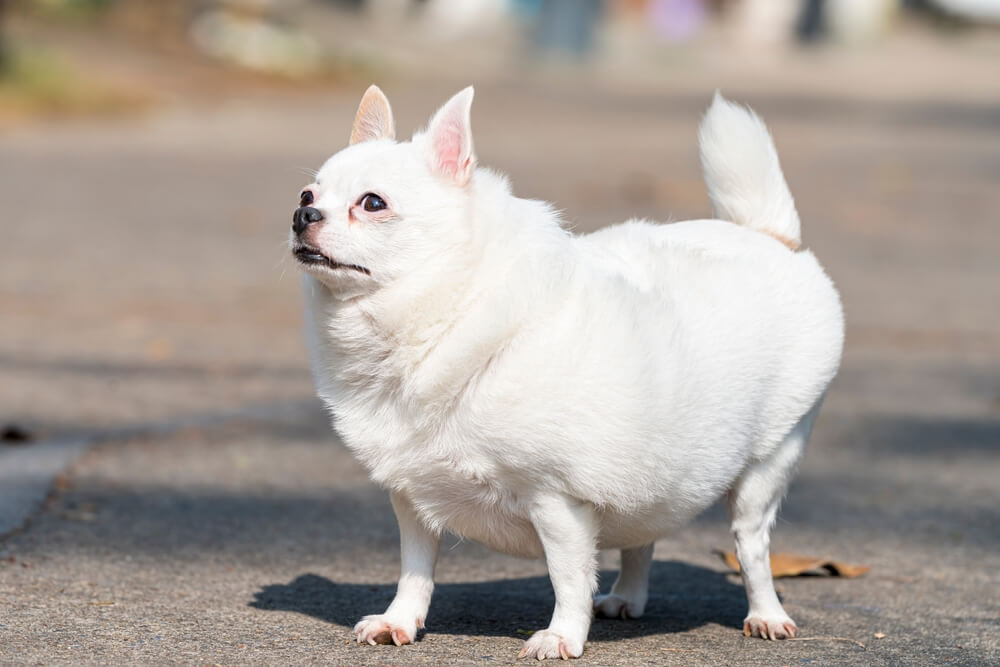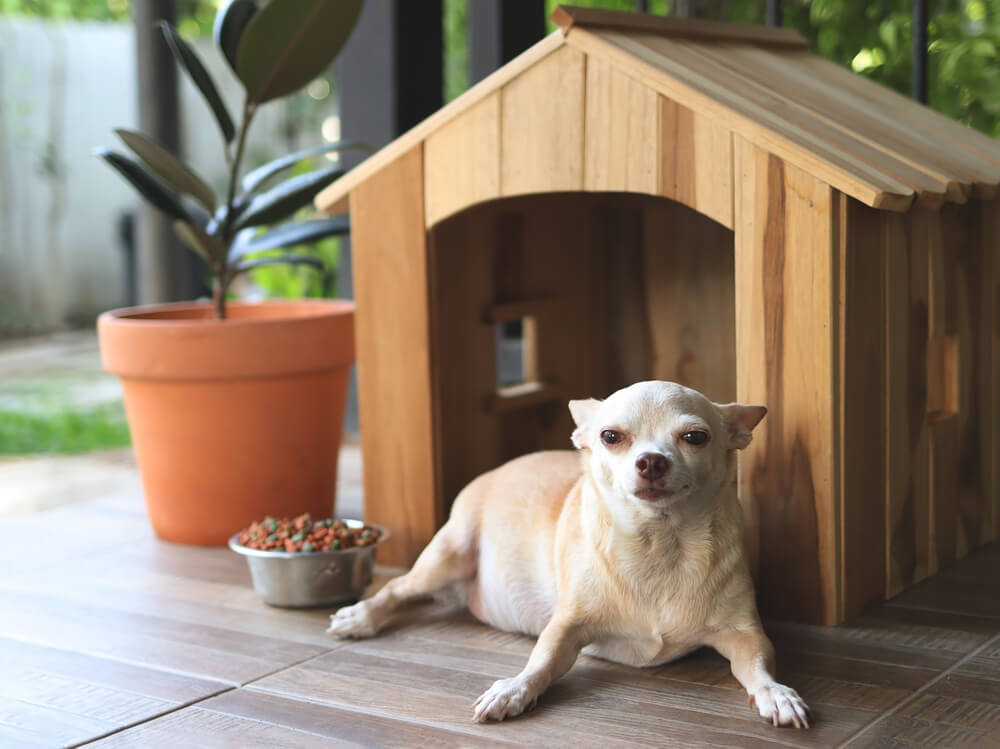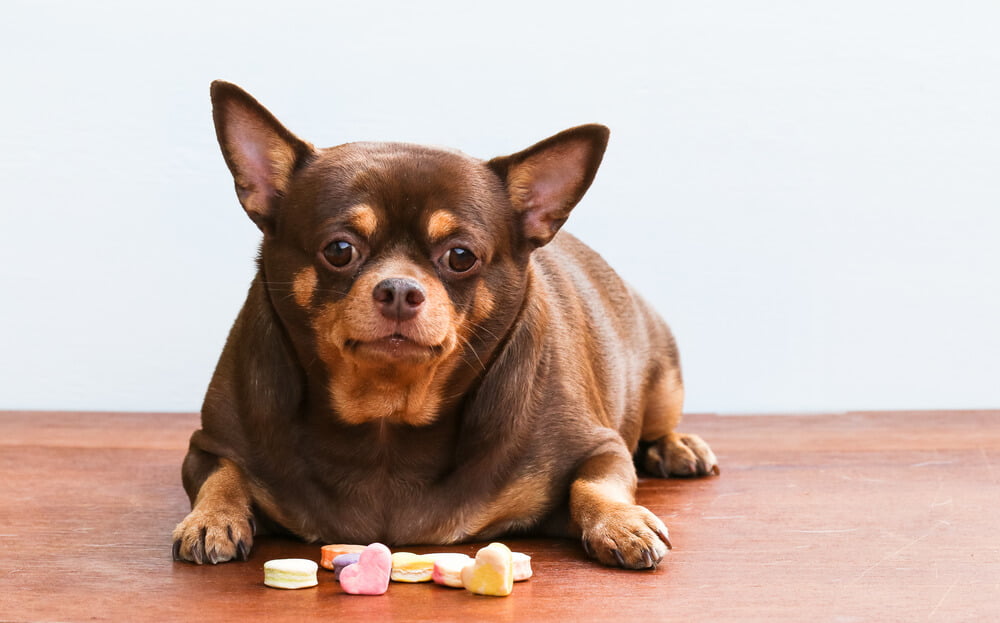Chihuahuas are adorable small dogs with big personalities. They’re known for their tiny size and are often seen sitting in handbags and being carried around. Did you know that obesity is an issue for these little dogs? Yes, obesity is a common problem and it can be detrimental to their health and even reduce their lifespan. We’ll tell you how to spot the signs of obesity in your Chihuahua and what you can do about it.
Is Your Chihuahua Overweight or Obese?

You can check your Chihuahua’s fat coverage over their ribs and be able to always feel the ribs with a little bit of fat lying over them.
Many dog owners are unsure how to tell if their dog is overweight. Weight isn’t an accurate measurement as most dogs have different builds and muscle mass but in general, Chihuahuas shouldn’t be over 6 lbs in weight. We prefer to check if they’re overweight by checking their body condition (known as body condition score). It can be difficult to assess, especially in fluffy dogs. Luckily, most Chihuahuas have short coats so it’s a little easier to check.
One of the first things that we can check is the fat coverage over their ribs. You should always be able to feel the ribs with a little bit of fat lying over them. If you’re finding it very difficult to feel the ribs, it’s likely that your Chihuahua is carrying some extra weight. On the other hand, if the ribs feel very bony and are sticking out, your Chihuahua could be underweight.
Another thing that you can check is their waist or abdomen tuck. If you look down at your Chihuahua’s back, you can check their waist which is just further back from the end of their ribcage. You should notice the waist is narrower than the end of the ribcage and there should be a noticeable tuck inwards after the ribcage. If your Chihuahua has no tuck and is barrel-shaped with no narrowing, they could be overweight.
Some obese Chihuahuas might also carry extra weight on other parts of their body. You might notice extra fat around their neck, shoulders, and hips. These can all be signs that your dog is carrying more weight than they should be.
Is Your Chihuahua Overweight Due to a Health Reason?

Conditions that can cause dogs to become overweight include hypothyroidism, diabetes, and Cushing’s disease which may lead to other related symptoms.
Many people ask this when the vet says that their pet is overweight. The answer is that it’s possible but it’s likely that your dog will also have other symptoms if this is the case.
Conditions that can cause dogs to become overweight include; hypothyroidism (underactive thyroid), diabetes, and Cushing’s disease (overactive adrenal gland). If your dog has one of these conditions it’s likely that they will have other symptoms which can include;
- Increased drinking and urination
- Increased or decreased appetite
- Skin changes
- Vomiting or diarrhea
- Lethargy
If your dog has gained weight for no apparent reason and has symptoms, visit your veterinarian to get them checked. Your vet might run some blood and urine testing to check for underlying conditions.
What Can You Do To Help Your Chihuahua Lose Weight?
If your Chihuahua is overweight or obese and it isn’t due to a health reason, there are ways to help them lose weight. Just like humans, diet and exercise is the foundation of weight loss.
If your Chihuahua doesn’t exercise much and is carried around a lot, this could be the cause of their weight gain. Increase their activity levels by bringing them on 1-2 walks daily and carry them less. If they’re not used to exercising, start with short 5-minute walks and increase this gradually as their fitness improves. Not alone is exercising good to shed some pounds, but it’s also good for their heart health and improving muscle mass which helps their mobility.
So get out the dog leash and enjoy some walks with your Chihuahua!
Nutrition for Your Chihuahua

It’s important to remember that treats should only make up 10% of your dog’s diet, less if they’re trying to lose weight.
Exercise is super important for weight loss and keeping your dog trim, but nutrition is equally if not more important than this. Feeding your Chihuahua a high quality complete & balance dog food is essential for their health and proper development.
There are many dog foods out there on the market and not all of them are good for your pup. Many diets contain long ingredient lists with lots of preservatives. Many dog foods also contain cheap filler ingredients that have high amounts of carbohydrates (which can convert to sugar) and poor protein sources. These could predispose your dog to overeating and weight gain.
It’s very important to pick a dog food that is high in protein and low in carbs. It should have a simple ingredient list with no preservatives and should be approved by AAFCO (Association of American Feed Control Officials).
Don’t be tempted to feed your Chihuahua bits of food from your plate. This can lead to overeating and also gives your dog a habit of begging for food. The same goes for treats, don’t feed excessive amounts of treats. Treats should only make up a maximum of 10% of your dog’s diet if they’re trying to lose weight.
How Does Obesity Affect Your Chihuahua’s Health?
I’m sure most of us know that obesity is really bad for human health and it’s the same for our dogs. There are many ways in which obesity can negatively affect the body.
First of all, obesity involves the body carrying a lot of extra weight. This extra body weight can put a lot of pressure on canine joints and limbs predisposing them to injury, spinal problems, and osteoarthritis. This is especially the case for Chihuahuas as they are so tiny in size and have very small legs. Any extra body weight puts too much pressure on their little legs.
Apart from the physical implications of obesity, it can also predispose them to many health conditions. It can make your dog more likely to develop heart disease, and diabetes (especially if being fed high carbohydrate diets) and could lead to chronic inflammation. It is widely known that obesity can lead to chronic inflammation in humans and it’s thought to be the same in dogs. Chronic inflammation can predispose dogs to cancer and many long-term inflammatory conditions. It’s widely thought that chronic inflammation is the root cause of almost all chronic diseases. Feeding a high-quality diet that’s low in carbs and keeping your dog trim can help to reduce chronic inflammation.
Conclusion
Obesity is a common issue in Chihuahuas today and it can be prevented by regular exercise and a high quality diet. It can lead to harmful health issues such as heart disease, diabetes, mobility conditions and chronic inflammation. You can check if your dog is obese by checking the fat over their ribcage, waist, neck, shoulders, and hips. If you’re unsure, consult with your veterinarian to get advice.
Frequently Asked Questions:
What is considered obese for a Chihuahua?
Chihuahuas generally shouldn’t be over 6 lbs in weight and they shouldn’t have too much fat covering over their ribcage and waist.
How can I help my overweight Chihuahua?
Increasing activity levels, feeding a high-quality diet that’s low in carbs, and scaling back their amount of treats will help your overweight Chihuahua.
Why is my Chihuahua so fat?
Poor quality diets, overeating, and very little exercise can make Chihuahuas overweight.
How can an obese Chihuahua lose weight?
Obesity can be reduced by feeding a high-quality diet with low carbohydrates, increasing exercise, and cutting down on treats.



